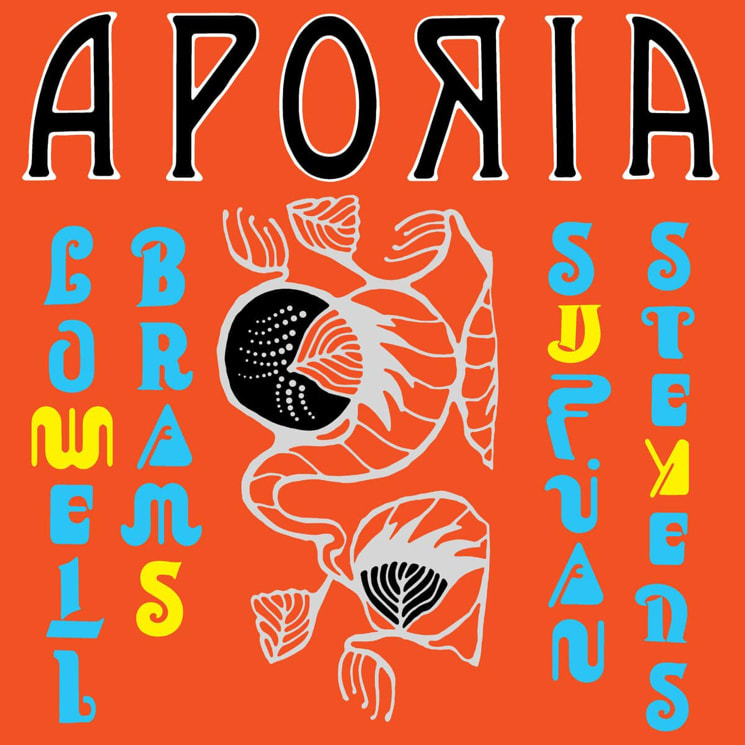When Sufjan Stevens met his latest collaborator, he was only five years old. Last year, when his stepfather and label cofounder Lowell Brams — yes, that Lowell, now almost 70 years old — announced his retirement from Asthmatic Kitty, the pair got to work on a new musical collaboration, Aporia.
The 21-song collection is a New Age record built on the backs of analogue synthesizers and instrumentation contributed by a host of famed musicians including the National's James McAllister, Sunn O)))'s Steve Moore and the Shins' Yuuki Matthews, among others. Though technically not Brams and Stevens' only time recording together, Aporia is their first co-release — and it could likely be their last.
The record blends Stevens' brightest sonic sketches with Brams' dutifully explorative electronic sensibilities. For those that have followed Brams' recording career, this set of atmospheric, drone-centric tracks makes a lot of sense aesthetically. And while Aporia doesn't signal a canonical move for Sufjan lore, fans will notice immediate similarities to 2004's Enjoy Your Rabbit, as well as fragments of 2017's Carrie & Lowell Live and Planetarium.
This latest effort draws largely from these more experimental tendencies — waiting a whole 13 tracks before introducing any prominent percussive components, and employing vocal elements only sparingly. Lyrics bring weight when applied on the record's only radio-ready single "The Runaround," a standalone piece that hearkens to Stevens' more conventional output typical of his releases from the last decade.
There are other anomalies on the record; the dance floor-oriented "Captain Praxis" completely switches up the record's hazy tempo toward the album's end, while the vocally minded "Climb That Mountain" is steeped in the angelic choral elements fans have come to expect from Sufjan's Christmas catalogue.
Largely though, Aporia would be best suited to a movie score or soundtracking a meditation practice. Each fuzzed-out song lends itself to a distinct '80s sci-fi aesthetic: it always leans futuristic, compositionally just shy of dystopian. Cinematic as it is, Aporia is devoid of Stevens' traditional orchestral leanings — there is no woodwind, no pomp, no fanfare. It is atypical in that it moves away from his customary kitsch.
Fans of Illinois, Seven Swans, Michigan and even Age of Adz won't encounter these records' signature introspection or religious themes. Ditching Stevens' baroque tendencies (and banjo) for the record, the duo have come together for Brams' final output as the head of AKR. As such, Aporia is foremost an exercise in collaboration — a meeting between two perpetually entangled personalities, an ode to their decades-long father-son relationship and a fitting conclusion to their musically enriched partnership.
(Asthmatic Kitty)The 21-song collection is a New Age record built on the backs of analogue synthesizers and instrumentation contributed by a host of famed musicians including the National's James McAllister, Sunn O)))'s Steve Moore and the Shins' Yuuki Matthews, among others. Though technically not Brams and Stevens' only time recording together, Aporia is their first co-release — and it could likely be their last.
The record blends Stevens' brightest sonic sketches with Brams' dutifully explorative electronic sensibilities. For those that have followed Brams' recording career, this set of atmospheric, drone-centric tracks makes a lot of sense aesthetically. And while Aporia doesn't signal a canonical move for Sufjan lore, fans will notice immediate similarities to 2004's Enjoy Your Rabbit, as well as fragments of 2017's Carrie & Lowell Live and Planetarium.
This latest effort draws largely from these more experimental tendencies — waiting a whole 13 tracks before introducing any prominent percussive components, and employing vocal elements only sparingly. Lyrics bring weight when applied on the record's only radio-ready single "The Runaround," a standalone piece that hearkens to Stevens' more conventional output typical of his releases from the last decade.
There are other anomalies on the record; the dance floor-oriented "Captain Praxis" completely switches up the record's hazy tempo toward the album's end, while the vocally minded "Climb That Mountain" is steeped in the angelic choral elements fans have come to expect from Sufjan's Christmas catalogue.
Largely though, Aporia would be best suited to a movie score or soundtracking a meditation practice. Each fuzzed-out song lends itself to a distinct '80s sci-fi aesthetic: it always leans futuristic, compositionally just shy of dystopian. Cinematic as it is, Aporia is devoid of Stevens' traditional orchestral leanings — there is no woodwind, no pomp, no fanfare. It is atypical in that it moves away from his customary kitsch.
Fans of Illinois, Seven Swans, Michigan and even Age of Adz won't encounter these records' signature introspection or religious themes. Ditching Stevens' baroque tendencies (and banjo) for the record, the duo have come together for Brams' final output as the head of AKR. As such, Aporia is foremost an exercise in collaboration — a meeting between two perpetually entangled personalities, an ode to their decades-long father-son relationship and a fitting conclusion to their musically enriched partnership.
